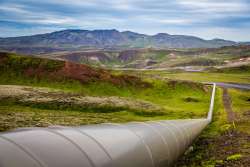NRDC started fighting the Mountain Valley Pipeline (MVP) in 2015—eight years ago. We have opposed this pipeline for so long, as part of a powerful and diverse coalition of regional, local, and national partners, because it is uniquely dangerous, unneeded to meet energy demands, and destructive to communities, the climate, clean water resources, endangered species habitat, and public lands. For some of these same reasons, federal courts had struck down permits for the pipeline that had been issued by the Trump administration.
In June, Congress passed legislation to extend the national debt limit that unfortunately included a nefarious provision intended to rubber-stamp MVP and prevent federal courts from reviewing new permits. While this legislation was needed to prevent the U.S. from defaulting on its debt, the entirely unnecessary MVP section is a devastating blow for affected communities in West Virginia and Virginia. As NRDC CEO Manish Bapna said, the extreme MVP language makes “a mockery of the process of responsible public oversight.”
Our work on MVP is not over. NRDC is working with our partners to demand federal agencies strengthen construction oversight and standards for MVP, should construction begin. As detailed in a previous blog, MVP is a uniquely risky pipeline; construction and operation both present significant threats to nearby communities and resources.
The pipeline’s large diameter and high pressure make it a higher risk pipeline than most other gas transmission pipelines, and this risk is further increased by the steepness of the Appalachian mountain slopes it would traverse for long distances. MVP would traverse 75 miles of the steepest slopes in Appalachia and more than 200 miles with “high landslide susceptibility,” which places it at higher risk for explosions. This has never been attempted for a large gas pipeline. This is particularly concerning given that the pipeline owner has already been cited by West Virginia and Virginia regulators for more than 500 violations of permit conditions and environmental laws, with 429 water crossings still to be constructed.
Unfortunately, federal regulations don’t require the most protective safety standards. That’s why NRDC and our partners recently sent a letter to the heads of the Federal Energy Regulatory Commission (FERC), the Army Corps of Engineers, and the Pipeline and Hazardous Materials Safety Administration (PHMSA). We asked them to impose the strongest possible measures to ensure the safety of the people, lands, and clean water along the pipeline’s path.
These measures include:
Imposing the highest safety standards for pipe integrity and pipe anti-corrosion coatings on pipe stored above ground;
Requiring immediate installation of another anti-corrosion method called cathodic protection for all below-ground pipe;
Eliminating any operator discretion when applying extra precautions to “High Consequence Areas” considered to present the greatest risk to human life, property, and the environment; and
Requiring a geohazard mitigation plan for the entire route. MVP’s route has a high percentage of geohazards such as extensive karst with subsurface streams and aquifers, caves, sinkholes, and an active seismic zone.
Among the local groups who will be leading efforts to demand strong safety and environmental standards are POWHR (Protect Our Water, Heritage, Rights), Appalachian Voices, Wild Virginia, and the West Virginia Rivers Coalition. NRDC is honored to partner with them to continue our fight against dangerous and unnecessary fossil fuel infrastructure in Appalachia, including MVP’s Southgate Extension, a new pipeline proposed to cross from southern Virginia into North Carolina.





